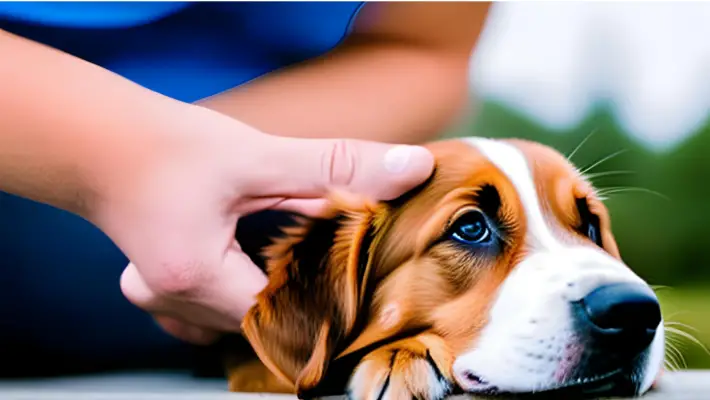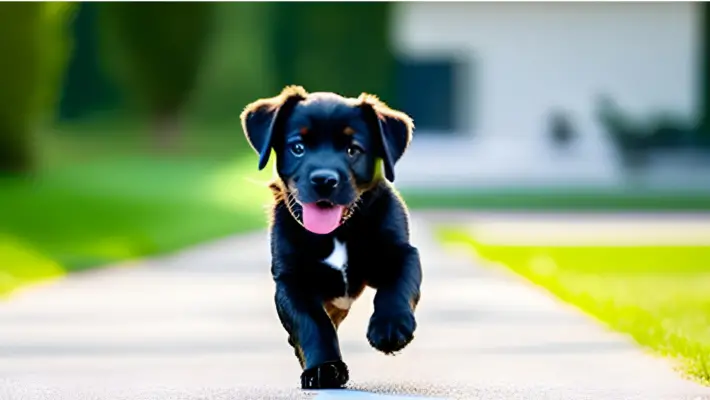Vaccines are vital preventative medicine for dogs. While some may exhibit mild behavioral changes like lethargy, decreased appetite, restlessness, or irritability after shots, these symptoms are temporary. Accept them as normal side effects, keep your dog comfortable, and contact your vet if concerning symptoms last over 2-3 days. With attentive observation and care, your dog will be protected against serious illness, without any vaccination and effects on their behavior or wellbeing.
Typical Vaccination Side Effects
Vaccines work by stimulating the immune system to build antibodies against specific diseases. Like with human vaccines, it’s normal for dogs to experience some side effects as their body builds this immune response. These are usually mild and temporary.

Common side effects after vaccination include:
- Soreness, swelling, or redness around the injection site
- Mild fever
- Decreased appetite
- Lethargy or tiredness
- Mild gastrointestinal upset (vomiting or diarrhea)
These effects typically start within 24 hours of the vaccination and clear up within a few days. Your vet can advise you on managing any discomfort during this time.

Uncommon But Notable Behavior Changes
While most dogs experience minimal reaction to vaccines, some may exhibit more pronounced behavioral changes:
Increased aggression
Some dogs become irritable, snippy, or aggressive after vaccines. This is likely related to feeling under the weather. Make sure children and strangers avoid interacting too closely with your dog during this time. Keep them comfortable in a quiet area. Discuss medication with your vet if aggression is an ongoing issue.
Excessive licking
Licking around the injection site is common. But some dogs become obsessive about licking their flank or leg excessively after vaccines. Redirect their attention with toys or treats. Use an Elizabethan collar if licking gets out of hand.
Hiding or restlessness
Your social dog may start hiding under furniture or seem restless after shots. This is another sign of not feeling well. Allow them to rest undisturbed until these behaviors subside.
Loss of housetraining
An uncommon side effect is loss of bladder or bowel control after vaccination. This is likely stress-related. Be patient and stick to your regular housetraining protocols. Symptoms should pass within a few days.
Lack of appetite
Although mild loss of appetite is common, some dogs may refuse all food for a day or longer post-vaccination. As long as your dog seems energetic otherwise, this is not dangerous. Entice them to eat with special wet food or broth.
Itching
Some dogs may excessively lick, bite, or scratch at themselves. This may indicate vaccination-related itching. Anti-itch sprays or medications can provide relief. Check with your vet.
While alarming, these behavior changes are temporary. Make sure to alert your vet if concerning symptoms last more than 2-3 days post-vaccination.
Why Do Vaccines Affect Behavior?
Vaccines trigger an immune and inflammatory response. This causes physical side effects as the body reacts. Behavior changes are tied to this feeling of being unwell. Possible reasons vaccines impact behavior include:
- Soreness or headache– Just like humans, dogs can develop headaches or body aches after vaccination. This causes grumpiness and lethargy.
- Gastrointestinal discomfort– Nausea, vomiting, or diarrhea can make dogs anxious, irritable, or low energy.
- Joint pain– Inflammation around joints can cause general or localized pain after shots.
- Itchiness– Allergic reaction to ingredients can cause miserable itching for some dogs.
- Stress– Visiting the vet and getting injections causes anxiety for some dogs, leading to physical reactions.
- Low grade fever– Feeling warm and feverish is another reason your dog may seem uncomfortable and restless.
- Reaction to medications– Anti-inflammatory medication prescribed after shots can occasionally cause behavioral changes too.
Fortunately, these biological responses are temporary. As your dog’s immune reaction subsides, behavior usually returns to normal within 3 days.
Minimizing Vaccine Reactions
While most dogs bounce back from vaccines with no problem, you can take steps to minimize reaction and behavior changes:
- Avoid multiple vaccines at once– Combining several immunizations can increase risk of reactions. Ask to spread out shots at least 2-3 weeks apart when possible.
- Have your vet prescribe antihistamines– For dogs with vaccine hypersensitivity, antihistamines can help prevent itching and hives.
- Discuss non-injectable options– Some vaccinations are available as oral or nasal sprays, which provoke less systemic reaction.
- Consider pre-treating with anti-inflammatories– Your vet may recommend giving anti-inflammatory medication before and after shots to prevent joint pain and swelling.
- Provide plenty of rest and isolation– Keep your dog comfortable and away from other pets and children during the days after vaccination to avoid stress.
- Monitor appetite and energy– Track any loss of appetite or lethargy lasting more than 24 hours and notify your vet.
- Be vigilant for itching or licking– Redirect obsessive licking and discuss anti-itch medication with your vet promptly if needed.
When to Worry After Vaccines
In most cases, behavioral changes are mild and last 2-3 days. Contact your vet if:
- Loss of appetite lasts over 48 hours
- Lethargy lasts more than 24 hours
- Itching, licking or restlessness is severe
- Aggression is extreme or persistent
- Housetraining suddenly deteriorates
- Symptoms last over 3 days
Also seek immediate medical care if your dog experiences:
- Swelling around the face or neck
- Pale gums
- Excessive drooling
- Trouble breathing
- Collapse or seizures
These signs of allergic reaction or anaphylaxis require emergency veterinary treatment.
While vaccines protect your dog against serious illness, their immune components can prompt temporary behavior changes. Understanding common side effects can help you support your dog through any discomfort. Be observant in the days following vaccination and follow your vet’s guidance for relieving any negative reaction.
With some patience and TLC, your dog will soon be back to their normal happy, healthy selves! Vaccines are a safe, essential part of keeping your dog their best. A few days of mild effects is a small price to pay for a lifetime of good health.


